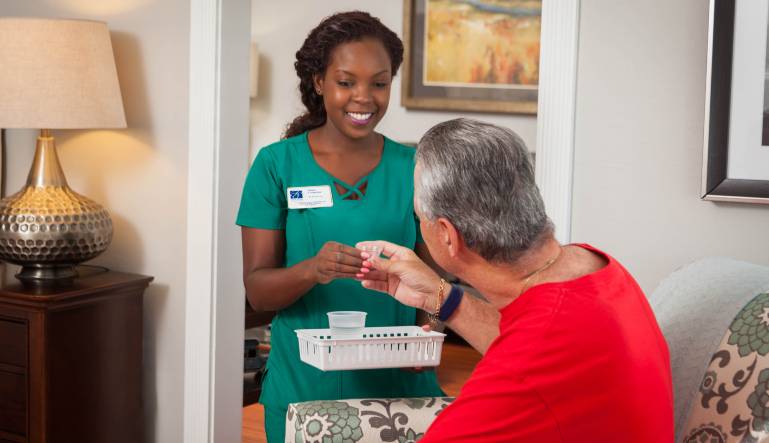Enjoy a routine-based lifestyle in a secure Memory Care community.
How Assisted Living Facilities Enhance Lifestyle for Those With Dementia
The combination of appealing programs and family members involvement further improves the citizens' experience. The intricacies of dementia treatment proceed to develop, prompting a better evaluation of how these facilities adapt and introduce to satisfy the difficulties encountered by locals and their family members.
Personalized Care Plans
(Dementia Care Charlotte)In most cases, people with mental deterioration call for customized support that addresses their distinct needs and preferences. Customized care strategies are vital in assisted living settings, as they ensure that each resident gets suitable focus and services. These strategies are created collaboratively, involving health care professionals, caregivers, and relative to create a thorough introduction of the person's clinical background, cognitive capacities, and personal interests.
A well-structured tailored care strategy normally includes specific goals connected to wellness monitoring, everyday activities, and social engagement. It accounts for the individual's cognitive decline while promoting independence and self-respect. Regular analyses and updates to the treatment plan are essential, as they enable adjustments based on the citizen's progressing problem and choices.
Trick elements of these plans commonly involve medicine administration, behavior support techniques, and dietary guidelines customized to the individual's needs (Memory Care). By concentrating on personalized care, aided living centers can foster a supportive environment that enhances the lifestyle for people with dementia, eventually adding to their general well-being and happiness. This individualized technique values the originality of each resident, ensuring they obtain the thoughtful care they need

Engaging Tasks and Programs
Involving residents in significant tasks and programs is crucial for boosting the high quality of life for people with mental deterioration. These activities not just offer enjoyment yet additionally stimulate cognitive function and advertise social interaction, which can mitigate feelings of seclusion often experienced by residents.

In addition, customized programs are crucial in making sure that each citizen's distinct choices and capabilities are recognized. This customized strategy urges participation, improves self-worth, and provides a sense of success.
In addition, normal analyses of citizens' rate of interests can aid staff modify and adjust tasks to far better fit advancing needs. By prioritizing interesting activities and programs, helped living centers can substantially enhance the general experience and psychological wellness of individuals living with dementia.
Safe and Encouraging Setting
Creating a secure and helpful environment is crucial for individuals with dementia, as it directly influences their well-being and lifestyle. Aided living facilities are created with specific attributes that promote safety and security while promoting a sense of protection and comfort. These environments prioritize ease of access, with layouts that lessen confusion and urge independence, allowing homeowners to browse their environments more quickly.
Precaution, such as protected entrances and leaves, prevent roaming and unapproved access, which are crucial considerations for individuals with dementia (Memory Care). Employee are trained to identify the special demands of homeowners, providing tailored support and guidance to ensure their safety. In addition, the incorporation of relaxing shades and acquainted items can assist decrease anxiousness and disorientation, producing a much more reassuring ambience.
In enhancement to physical security, emotional assistance is paramount. Facilities commonly employ staff who are not just experienced in caregiving but also trained in empathy and communication, cultivating trust and rapport with citizens. This alternative technique adds to a nurturing atmosphere where individuals really feel valued and recognized, ultimately boosting their general lifestyle.
Social Communication and Community
A helpful setting not just prioritizes safety yet likewise promotes possibilities for social interaction and neighborhood engagement, which are important for people with dementia. In assisted living centers, structured activities and communal rooms motivate citizens to connect with each other, decreasing feelings of seclusion often experienced by those with cognitive impairments.
Social interaction plays a substantial duty in boosting emotional wellness and cognitive feature (Assisted Living). Engaging with peers in group activities such as games, arts and crafts, or workout not only boosts cognitive abilities however additionally supports a feeling of belonging. Facilities usually organize events that advertise socialization, enabling residents to build relationships and share experiences, which can be especially beneficial for those with mental deterioration
Moreover, a vivid area atmosphere can improve the total high quality of life for homeowners. Team members are educated to promote interactions and assistance residents in developing meaningful connections.
Family Members Participation and Assistance
Household involvement is essential in supporting people with dementia in assisted living atmospheres. Proactively engaging member of the family not only provides psychological comfort to citizens but also promotes a feeling of belonging and continuity in their lives. When households join care planning and everyday tasks, they add valuable insights regarding the person's preferences, history, and requires, which can enhance individualized treatment.
Moreover, regular family check outs can dramatically boost the psychological well-being of locals, minimizing sensations of seclusion and anxiousness. Family members weblink can also help in preserving cognitive feature by involving their liked ones in acquainted conversations and activities. This interaction reinforces personal identity and helps locals feel valued and comprehended.

Conclusion
In conclusion, assisted living facilities dramatically boost the high quality of life for people with mental deterioration via customized care plans, involving activities, and a secure environment. Jointly, these factors develop a holistic technique to care that addresses the unique demands of individuals with dementia, advertising overall wellness and self-respect.